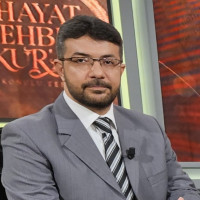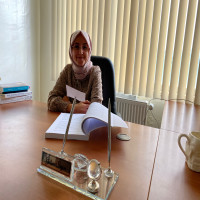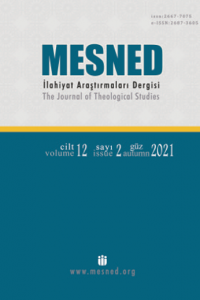Makaleler
Çeviri
Kitap Kritiği
Issue Editorial Board






Aim & Scope
Journal of Mesned Divinity Researches is an international academic journal published twice a year by İnönü University Faculty of Theology on 30 June and 31 December. Mesned journal, which started its publication life with 2667-7075 ISSN and 2687-3605 e-ISSN in 2019, was the continuation of İnönü University Faculty of Theology Journal, which was published as of 2010.
Mesned Journal is a refereed journal that aims to contribute to national and international knowledge by publishing original research articles, compilation articles, research notes, books and symposiums in the field of theology specialization and social sciences, and translation-interpretation studies from classical languages.
Articles with positive reports by at least two referees as a result of the blind referee evaluation process are published in Mesned Journal.
In Mesned journal, articles that have not been published before and that do not contain plagiarism are accepted through iThenticate (Academic Plagiarism Prevention Program).
Basic Islamic Sciences: Arabic Language and Literature, Hadith, Islamic Law, History of Islamic Sects, Kalam, Quran, Sufism and Tafsir;
Philosophy and Religious Studies: Religious Education, Philosophy of Religion, Psychology of Religion, Sociology of Religion, History of Religions, Islamic Philosophy and Logic;
Islamic History and Arts: Islamic History, History of Islamic Arts, Turkish-Islamic Literature and Religious Music
includes studies in their fields.
Author Guidelines
· Article volume should not exceed 9,000 words.
Text font should be Palatino Linotype and size 10 points, footnotes 8 points. Isnad Citation System will be based on the spelling rules.
· The articles, whose referee process is completed / passed by the referee, are requested with an abstract of 150 words
. An extended summary of 600-750 words in the published language and foreign language is requested from accepted research articles (Turkish and English for Turkish works, Arabic and Turkish extended abstracts for Arabic works). The extended summary to be used in the short summary and abstract article metadata will be included in the content.
- It uses the Isnad Citation System, which is compatible with the Chicago System (The Chicago Manual of Style), in citation and bibliography of the articles published in the Journal of Mesned Divinity Researches
- article writing template
Ethical Principles and Publication Policy
The publishing processes applied in Mesned Journal constitute the basis for the development and distribution of information in an impartial and respectful manner. The processes implemented in this direction directly reflect the quality of the work of the authors and the institutions that support the authors. Peer-reviewed studies are studies that embody and support the scientific method. At this point, it is important that all stakeholders of the process (authors, readers and researchers, publishers, referees and editors) comply with the standards of ethical principles. Within the scope of Mesned Journal's publishing ethics, all stakeholders are expected to bear the following ethical responsibilities.
The ethical duties and responsibilities below have been prepared by taking into account the guidelines and policies published by the Committee on Publication Ethics (COPE) as open access (See COPE Directive in Turkish).
Also see. Decisions of Theology Journals Editors Workshop (20/01/2018)
The publication of an article in a peer-reviewed journal is a necessary basic building block for the development of a harmonious and respected information network. This is a direct reflection of the quality of the work of the authors and their supporting institutes. Peer-reviewed articles support and shape scientific methods. Therefore, reaching agreement on the standards of expected ethical behavior is important for all publishing parties, authors, journal editors, referees and publishing organizations:1. Authorship
. Bibliography list must be complete.
· Plagiarism and fake data should not be included.
· The same research should not be attempted to be published in more than one journal, science should comply with research and publication ethics.
Actions contrary to scientific research and publication ethics are:
a) Plagiarism: To present the ideas, methods, data, practices, writings, figures or works of others as if they were their own work, without reference to their owners in accordance with scientific rules,
b) Forgery: To produce data that is not based on research, to edit or change the presented or published work based on unreal data, to report or publish them, to pretend that a research has not been done,
c) Distortion: Falsifying the research records and the data obtained, showing the methods, devices and materials not used in the research as being used, not considering the data that are not suitable for the research hypothesis, playing with the data and / or results in order to conform to the relevant theory or assumptions, falsifying or shaping research results in line with their interests,
ç) Republishing: To present more than one work containing the same results of a research as separate works in evaluations for associate professorship exams and academic promotions,
d) Slicing: To present the results of a research as separate works in associate professorship exam evaluations and academic promotions by breaking down the results of a research in a way that disrupts the integrity of the research and by making many publications without reference to each other,
e) Unfair authorship: Including non-active contributors among the authors, not including those with active contributors among the authors, changing the author's order in an unjustified and inappropriate manner, removing the names of the active contributors from the work during publication or in subsequent editions, to include his / her name among the authors,
f) Other types of ethical violations: A person who has been assigned to not clearly state the supporters, institutions or organizations and their contribution to the research, not to comply with ethical rules in research on humans and animals, not to respect patients' rights in their publications, to review them as a referee. To share the information in the work with others before publication, to misuse the resources, places, facilities and devices provided or allocated for scientific research, to accuse completely baseless, unwarranted and deliberate violation of ethics (YÖK Scientific Research and Publication Ethics Directive, Article 8).
2. Author's Responsibilities
· All authors should contribute significantly to the research.
A statement that all data in the article are true and authentic.
· All authors must ensure retraction and correction of errors.
3. Responsibilities of Referees
· Evaluations should be impartial.
· Referees should not have conflicts of interest with research, authors, and / or research funders.
· Referees should indicate the relevant published works but not cited.
· Checked articles should be kept confidential.
4. Editorial Responsibilities
· Editors have full responsibility and authority to accept or reject an article.
· Editors should not have a conflict of interest with articles that they accept or reject.
· Only articles that will contribute to the field should be accepted.
· Support the release or withdrawal of the correction when errors are found.
· Keep the referees anonymous and prevent plagiarism / fake data.
The refereeing process is at the center of the success of scientific publishing. It is part of our commitment to protect and improve the refereeing process, and Mesned Journal has an obligation to assist the scientific community in all cases of publishing ethics, especially in cases of suspicious, duplicate publications or plagiarism.
When the reader notices an important error or mistake in an article published in Mesned Journal, or has any complaints about editorial content (plagiarism, duplicate articles, etc.), information about the situations they detect by sending an e-mail to mesned@inonu.edu.tr can deliver.
Journal of Mesned Divinity Researches carries out an Open Access Policy in addition to its free publication policy. The basic principle of our journal, which adopts the Budapest Open Access Initiative, is to present scientific information to users with open access.
Price Policy
Dergimizin yayın sürecinin her aşamasında ücretsiz hizmet verilmektedir.


